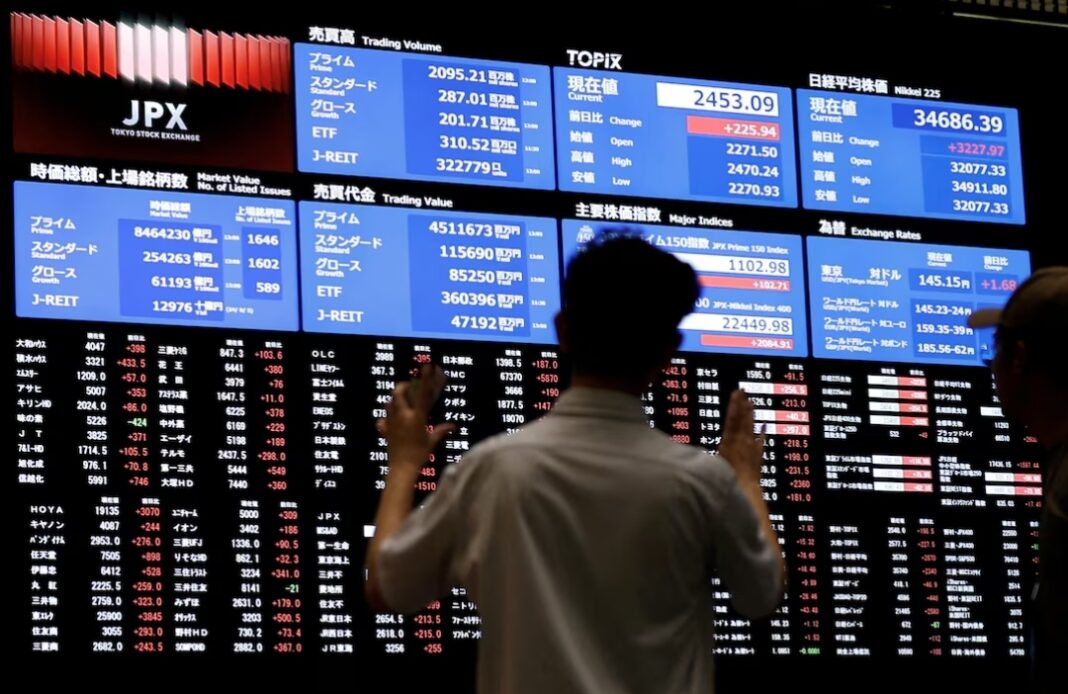Equity markets in Asia and Europe deepened losses on Friday, continuing a global selloff triggered by Donald Trump’s surprise tariff announcement. The move, which has sparked fears of an intensifying trade war, heightened concerns about recession and inflation.
Trump’s unexpected “Liberation Day” tariffs shook markets on Thursday, leading to the worst day for Wall Street since the early days of the Covid-19 pandemic. The US dollar plunged against major currencies.
Despite the market turmoil, the 78-year-old president expressed confidence that the economy would recover and eventually thrive, comparing the reshaping of the US economy to a medical procedure.
“It’s what is expected. The patient was very sick. The economy had a lot of problems. It went through an operation. It’s going to be a booming economy. It’s going to be amazing,” Trump said.
White House Press Secretary Karoline Leavitt also emphasized that the tariffs were non-negotiable. “The president made it clear yesterday this is not a negotiation,” she stated on CNN. Trump later added he would negotiate “as long as they are giving something that is good.”
Growing Fears of Retaliation
Concerns are mounting that other countries will retaliate, further damaging global trade. Some governments have already hinted at countermeasures, while others are assessing the full impact.
China has demanded the immediate cancellation of the tariffs, threatening retaliation, while France and Germany warned that the European Union could target US tech companies. French President Emmanuel Macron suggested suspending investment in the US until the tariffs are “clarified.” Japanese Prime Minister Shigeru Ishiba called the 24% tariffs on Japan a “national crisis.”
Jim Zelter, President of Apollo Global Management, stated that the risk of a US recession has risen to at least 50%. He also warned that the Federal Reserve faces a dilemma: hike interest rates to combat inflation or cut them to support the economy.
Markets React to Tariffs
Traders are focused on US jobs data set to be released later on Friday, seeking new clues about the health of the world’s largest economy. Fed Chairman Jerome Powell is also expected to address the nation.
In Asia, stock markets continued to slide, with Tokyo’s Nikkei falling 2.8%. Major automakers like Toyota, Nissan, and Honda saw significant losses. Tech companies, including Sony and SoftBank, also dropped sharply. In other Asian markets, including Sydney, Singapore, and Seoul, stocks were also in the red.
Hanoi’s stock market, which had plunged 7% the previous day due to tariffs on Vietnam, fell another 4.6%.
In Europe, London, Paris, and Frankfurt saw early declines. Markets in Hong Kong, Shanghai, Taipei, and Jakarta were closed for holidays.
On Wall Street, the Nasdaq dropped 6%, while the S&P 500 lost 4.8%, its biggest one-day drop since 2020. The Dow Jones fell by 4%.
The dollar remained under pressure, hitting a six-month low against the yen, euro, and pound. Oil prices continued to slide, exacerbated by fears of a recession impacting demand, and OPEC+ increasing supply unexpectedly.
Jose Torres, senior economist at Interactive Brokers, commented, “The historic selling pressure in stock markets is not an overreaction. Economic downturns have led to significant equity losses in the past. An economic slowdown is now a real possibility.”
Key Figures (As of 0715 GMT)
– Tokyo– Nikkei 225: DOWN 2.8% at 33,780.58
– London– FTSE 100: DOWN 0.6% at 8,421.23
– *mEuro/Dollar: UP at $1.1067 from $1.1050
– Pound/Dollar: DOWN at $1.3066 from $1.3099
– Dollar/Yen: DOWN at 145.96 yen from 145.99 yen
– West Texas Intermediate: DOWN 1.2% at $66.16 per barrel
– Brent Crude: DOWN 1.1% at $69.37 per barrel

